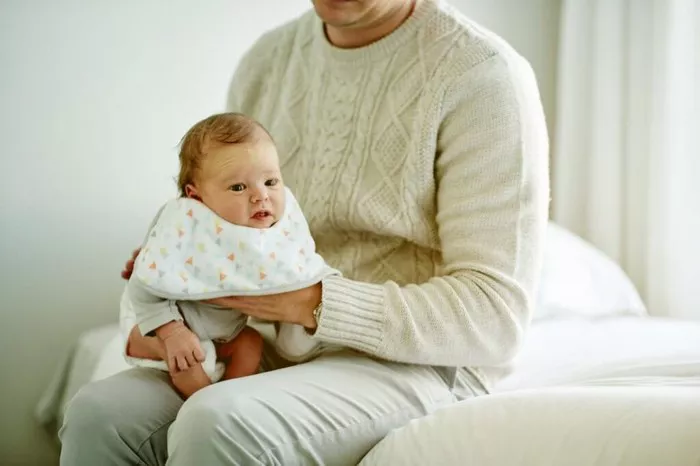Hiccups are a common and often harmless phenomenon, not just for adults but also for newborns. Many new parents experience concern when their little ones get hiccups, unsure of whether this condition could be harmful to them.
Understanding what causes hiccups and when to worry is crucial for parents and caregivers. This article will discuss whether hiccups can harm newborns, why they occur, and what you should know to keep your baby comfortable.
What Are Hiccups?
Hiccups are involuntary contractions of the diaphragm, the muscle that helps you breathe. These contractions cause a sudden closure of the vocal cords, leading to the characteristic “hic” sound. Hiccups can occur in anyone, from newborns to adults, and they typically don’t last long. In fact, they are a normal reflex that occurs in babies even before birth.
For newborns, hiccups often happen because their diaphragm is still developing and may not yet be fully coordinated.
Babies tend to get hiccups after feedings, although they can happen at other times as well. Newborn hiccups are usually brief, lasting just a few minutes, and they don’t appear to cause the baby any pain or distress.
Can Hiccups Harm a Newborn?
The simple answer is no. Hiccups are generally harmless and don’t pose a danger to newborns. While they may seem uncomfortable for your little one, they rarely indicate any serious underlying health problem. In most cases, hiccups are simply a sign that the baby’s body is adjusting to life outside the womb and learning how to regulate various bodily functions, including breathing and swallowing.
Why Do Newborns Get Hiccups?
Hiccups in newborns are caused by the same basic mechanism as in adults—the involuntary contraction of the diaphragm.
However, there are some specific reasons why newborns might get hiccups more frequently:
Immature Diaphragm: Newborns’ diaphragms are still developing, and as a result, they can contract more easily than in older children or adults. This is why hiccups are particularly common in the first few months of life.
Overfeeding or Swallowing Air: Sometimes, if a baby eats too much or swallows air during a feeding, it can cause the stomach to expand, which in turn irritates the diaphragm, leading to hiccups.
Excitement or Stimulation: Newborns can get hiccups when they are overstimulated or excited, especially during or after feeding sessions. This could be due to the changes in their environment or the sensation of being full.
Temperature Changes: Sudden temperature changes can trigger hiccups as well. For example, a baby might get hiccups if they go from a warm room to a cooler one, or if their body temperature fluctuates unexpectedly.
When Should You Be Concerned?
While hiccups themselves are generally harmless, there are certain situations where you might need to consult a doctor. If the hiccups last for an extended period (several hours or more) or are accompanied by other concerning symptoms such as difficulty breathing, vomiting, or signs of distress, it’s important to seek medical advice. These could indicate an underlying condition that needs attention, though these instances are rare.
How to Help Your Baby With Hiccups
Although hiccups are usually harmless and resolve on their own, there are a few things you can try to help ease your baby’s discomfort:
Burp Your Baby: If your baby gets hiccups during or after feeding, try burping them to release any trapped air. This can reduce the likelihood of hiccups occurring.
Change Feeding Positions: Experiment with different feeding positions to help your baby feed more comfortably and reduce the chance of swallowing air.
Offer a Pacifier: Sucking on a pacifier can sometimes help relax your baby and stop the hiccups, as it may regulate their breathing and ease diaphragm spasms.
Keep Them Upright: After feeding, keep your baby in an upright position for a while to help with digestion and reduce the chances of hiccups.
Gentle Patting or Rubbing: Lightly patting or rubbing your baby’s back can sometimes help relieve the discomfort associated with hiccups.
What Should You Avoid?
While hiccups are typically harmless, it’s important to avoid certain actions that could make the situation worse or cause unnecessary stress for your baby:
Overfeeding: Avoid overfeeding your baby in an attempt to get rid of the hiccups. This could exacerbate the problem and lead to discomfort or even spit-up.
Ignoring Other Symptoms: If your baby’s hiccups seem unusually persistent or are accompanied by other symptoms like crying, vomiting, or trouble breathing, don’t try to handle it on your own. Consult a pediatrician immediately.
Disruptive Methods: Avoid using forceful methods or home remedies like “scaring” the hiccups away, as these could potentially harm your baby. Always keep your approach gentle and calm.
When to See A Doctor
In rare cases, persistent or chronic hiccups in a newborn can be a symptom of an underlying medical condition.
If your baby has frequent hiccups that last for hours, or if they have other signs like difficulty feeding, poor weight gain, or excessive irritability, it’s best to consult your pediatrician. Some medical conditions that may be associated with prolonged or persistent hiccups include:
Gastroesophageal Reflux Disease (GERD): Hiccups may occur in babies with GERD, a condition where stomach acid flows backward into the esophagus, causing discomfort.
Respiratory Issues: In rare cases, hiccups may be a sign of respiratory issues, such as lung infections or airway obstructions.
Neurological Concerns: Though very rare, persistent hiccups could be a sign of a neurological problem affecting the brain or spinal cord.
Conclusion
For the most part, hiccups are not harmful to newborns and will not cause long-term harm. They are simply a normal part of development, as your baby’s body adjusts to the outside world. In most cases, hiccups are temporary and resolve on their own. However, if you notice any concerning signs, such as prolonged hiccups or other distressing symptoms, don’t hesitate to consult your healthcare provider. With the right care and attention, you can ensure your baby’s comfort during this common but often misunderstood experience.
Related topics:


